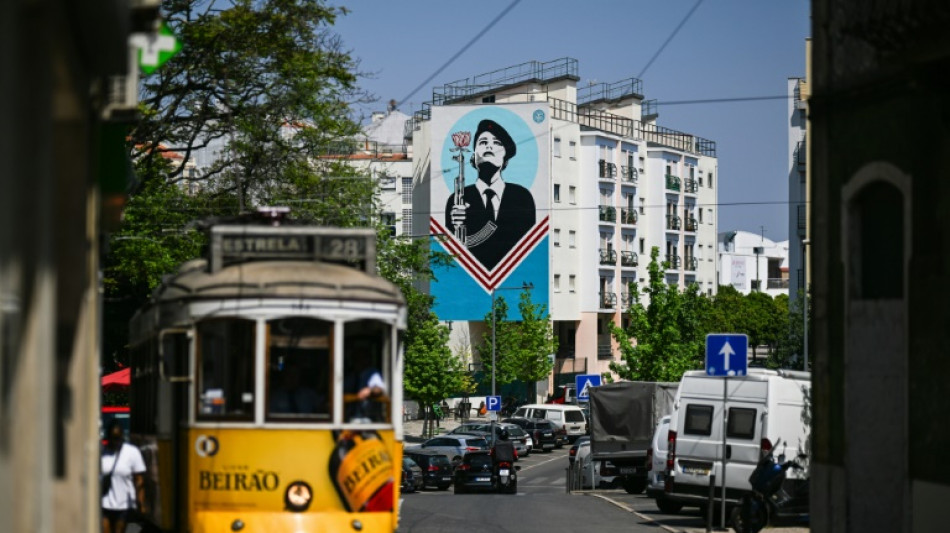
-
 Scotland boss Townsend picks veterans Gray and Cherry for Six Nations
Scotland boss Townsend picks veterans Gray and Cherry for Six Nations
-
Record try-scorer Penaud faces French axe for Six Nations

-
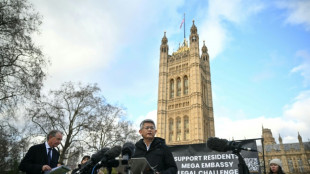 UK approves plans for Chinese mega-embassy in London
UK approves plans for Chinese mega-embassy in London
-
Rosenior keen to build winning ties with 'world-class' Fernandez

-
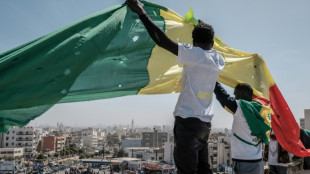 Dakar delights in Senegal parade honouring AFCON champions
Dakar delights in Senegal parade honouring AFCON champions
-
UK comedian Russell Brand in court on two new rape charges

-
 France set to face New Zealand with second-string squad
France set to face New Zealand with second-string squad
-
Eyeing China, EU moves to ban 'high-risk' foreign suppliers from telecoms networks

-
 Struggling Suryakumar will not adapt style to find form before T20 World Cup
Struggling Suryakumar will not adapt style to find form before T20 World Cup
-
World stocks sink, gold hits high on escalating trade war fears

-
 Easier said than done for US to apply tariffs on single EU states
Easier said than done for US to apply tariffs on single EU states
-
Canada military models response to US invasion: report

-
 Salah returns to Liverpool training after AFCON
Salah returns to Liverpool training after AFCON
-
Milan menswear shows add bling with brooches

-
 Scotland recall Gray, Cherry for Six Nations
Scotland recall Gray, Cherry for Six Nations
-
Scheib storms to Kronplatz giant slalom victory as Brignone impresses in World Cup return

-
 Chagos Islands: international dispute and human drama
Chagos Islands: international dispute and human drama
-
Thousands of farmers protest EU, Mercosur trade deal ahead of vote

-
 Men's Fashion Week kicks off in Paris with tributes for Valentino
Men's Fashion Week kicks off in Paris with tributes for Valentino
-
Lake named as captain as Wales unveil Six Nations squad

-
 Royals visit deadly train crash site as Spain mourns
Royals visit deadly train crash site as Spain mourns
-
Police, pro-Kurd protesters clash at Turkey border with Syria
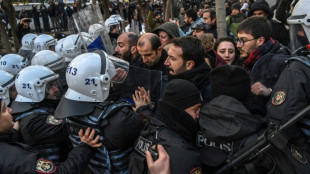
-
 Thai forces razed Cambodian homes on border: rights group
Thai forces razed Cambodian homes on border: rights group
-
Jellyfish-inspired Osaka battles into Australian Open round two

-
 Valentino taught us to respect women, says partner
Valentino taught us to respect women, says partner
-
Australia stiffens hate crime, gun laws after Bondi attack
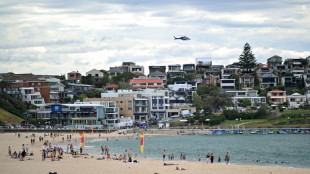
-
 Mercedes chief designer Owen to leave F1 team
Mercedes chief designer Owen to leave F1 team
-
Trump unloads on allies as Davos showdown looms

-
 Moscow revels in Trump's Greenland plans but keeps concerns quiet
Moscow revels in Trump's Greenland plans but keeps concerns quiet
-
Global tourism hit new record level in 2025: UN

-
 Senegal poised to party with parade honouring AFCON champs
Senegal poised to party with parade honouring AFCON champs
-
Osaka emerges for Melbourne opener under hat, veil and parasol

-
 Dogsled diplomacy in Greenland proves elusive for US
Dogsled diplomacy in Greenland proves elusive for US
-
Almost half of Kyiv without heat, power, after Russian attack

-
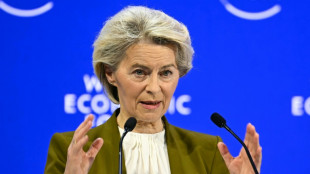 EU vows 'unflinching' response to Trump's Greenland gambit
EU vows 'unflinching' response to Trump's Greenland gambit
-
Osaka steals show at Australian Open as Sinner strolls through

-
 Brignone impresses in first run of Kronplatz giant slalom in World Cup comeback
Brignone impresses in first run of Kronplatz giant slalom in World Cup comeback
-
Osaka emerges for Melbourne opener under white hat and umbrella

-
 Malawi suffers as US aid cuts cripple healthcare
Malawi suffers as US aid cuts cripple healthcare
-
Bessent says Europe dumping US debt over Greenland would 'defy logic'

-
 Freeze, please! China's winter swimmers take the plunge
Freeze, please! China's winter swimmers take the plunge
-
Talks between Damascus, Kurdish-led forces 'collapse': Kurdish official to AFP

-
 In-form Bencic makes light work of Boulter at Australian Open
In-form Bencic makes light work of Boulter at Australian Open
-
Spain mourns as train disaster toll rises to 41

-
 Sinner into Melbourne round two as opponent retires hurt
Sinner into Melbourne round two as opponent retires hurt
-
Israel begins demolitions at UNRWA headquarters in east Jerusalem

-
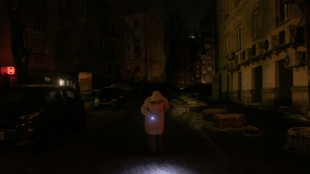 Almost half of Kyiv without heat, power, after Russian attack: govt
Almost half of Kyiv without heat, power, after Russian attack: govt
-
Veteran Monfils exits to standing ovation on Australian Open farewell

-
 Precision-serving former finalist Rybakina powers on in Melbourne
Precision-serving former finalist Rybakina powers on in Melbourne
-
South Korea's women footballers threaten boycott over conditions

| CMSC | -0.66% | 23.325 | $ | |
| NGG | -0.56% | 80.439 | $ | |
| BCC | -1.75% | 84.04 | $ | |
| RYCEF | 0.58% | 17.15 | $ | |
| RIO | -0% | 85.129 | $ | |
| SCS | 0.12% | 16.14 | $ | |
| JRI | -0.04% | 13.695 | $ | |
| VOD | 0.55% | 13.545 | $ | |
| GSK | -0.04% | 48.2 | $ | |
| BCE | 1.13% | 24.415 | $ | |
| BTI | -1.78% | 57.2 | $ | |
| AZN | -4.24% | 90.59 | $ | |
| BP | -0.14% | 35.33 | $ | |
| CMSD | 0.04% | 23.93 | $ | |
| RELX | -2.46% | 40.63 | $ | |
| RBGPF | -1.87% | 82.5 | $ |

Portugal marks 50 years of democracy with far right on rise
Portugal marks Thursday 50 years since a military coup ended a decades-long dictatorship and 13 years of colonial wars in Africa, an anniversary that comes as a far-right party gains prominence.
The anniversary of the Carnation Revolution -- named after the flowers protesters placed in soldiers' guns during the peaceful uprising -- comes a month after the far-right party Chega more than quadrupled its seats in parliament, cementing its position as Portugal's third-largest party.
The highlight of the celebrations will be a military parade through central Lisbon featuring some of the roughly 5,000 soldiers who were part of the putsch, as well as around 15 restored military vehicles used on the day.
On April 25, 1974, the oldest authoritarian regime in Western Europe at the time fell within a matter of hours, virtually without bloodshed, thanks to an uprising by non-commissioned officers that was immediately backed by the public.
The coup paved the way for the country's first free elections based on universal suffrage on April 25, 1975, as well as the independence of Portugal's remaining African colonies: Angola, Mozambique, Guinea-Bissau and Cape Verde.
"The main motivation was to resolve the problem of the colonial wars" that had been going on for 13 years in Angola, and almost as long in Mozambique and Guinea-Bissau, said retired colonel Vasco Lourenco.
Lourenco, one of the officers who took part in the coup, now heads the April 25 Association that represents putschist soldiers.
As a young officer, he said it took almost a year to put together the "conspiracy" to carry out "a coup d'etat aimed at opening the way to freedom, putting an end to the wars and building democracy in Portugal", he told AFP.
As it does every year, parliament will hold a special commemorative session and there will be a parade. And this year the heads of African states that were once Portuguese colonies will join the celebrations.
- 'Poor, backward, illiterate' -
Portugal's dictatorship years began in 1926, consolidated under prime minister Antonio de Oliveira Salazar and continued from 1968 by his successor Marcelo Caetano.
Many Portuguese believed the country's authoritarian past would offer it some protection from the rise of the far right, which has been seen elsewhere in Europe, but the breakthrough by Chega in a general election last month has dampened this view.
While its founder and leader Andre Ventura has criticised the dictatorship years, Chega ("Enough") has used the slogan "God, Homeland, Family, Work" -- an echo of the Salazar dictatorship's "God, Homeland, Family".
Set up in 2019, Chega promises greater law and order, tougher immigration measures and chemical castration for paedophiles.
It is the first hard-right party to gain ground on Portugal's political scene since the end of the dictatorship.
"I thought that 48 years of dictatorship would have made the country immune to this wave of populism and radical far-right movements, but the reality turned out to be different," said Maria Inacia Rezola, a historian who is overseeing the anniversary celebrations.
During the dictatorship Portugal remained "a poor, backward, illiterate country isolated from the rest of the world", Rezola said.
Despite the fact that the Carnation Revolution still appears widely appreciated, a sizable part of the population express a certain nostalgia for the previous regime.
A survey published last week found that half of respondents said the former regime had more negative aspects than positive -- but a fifth said the opposite.
T.Ziegler--VB



